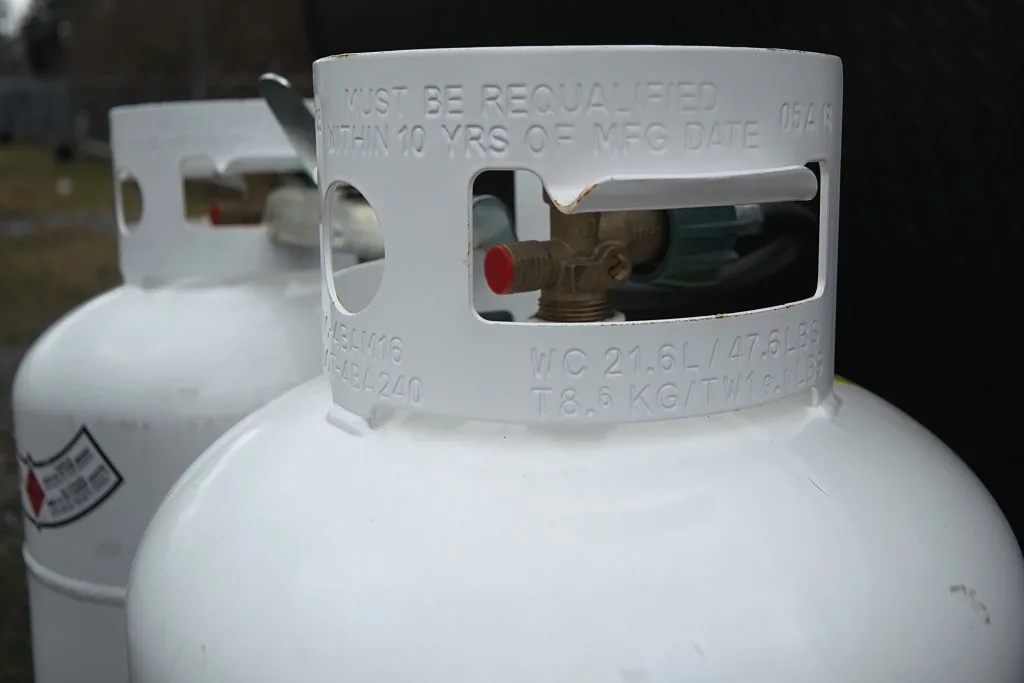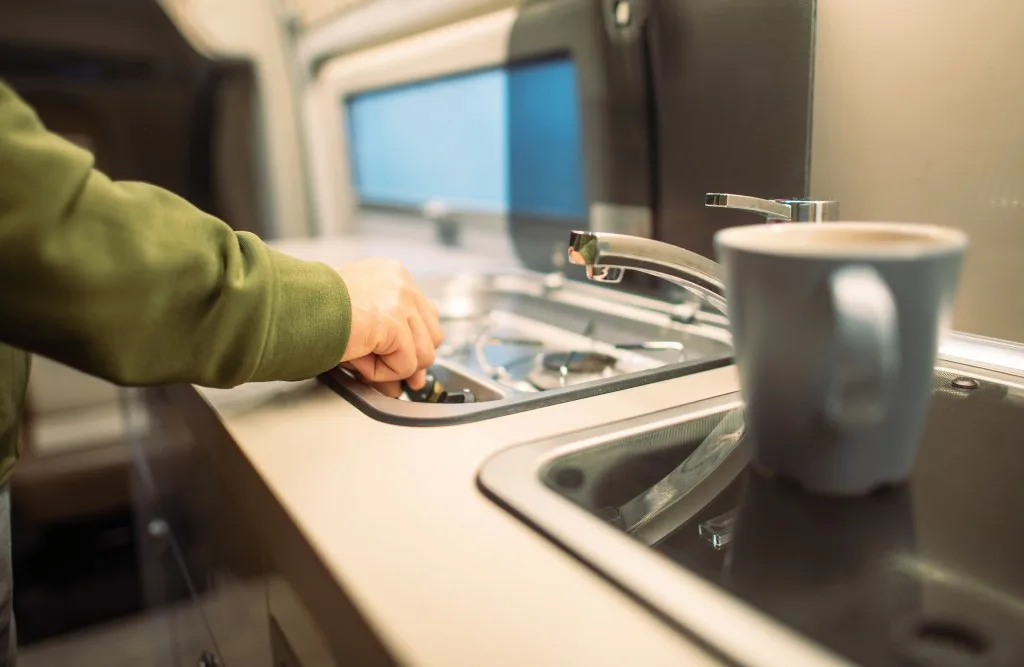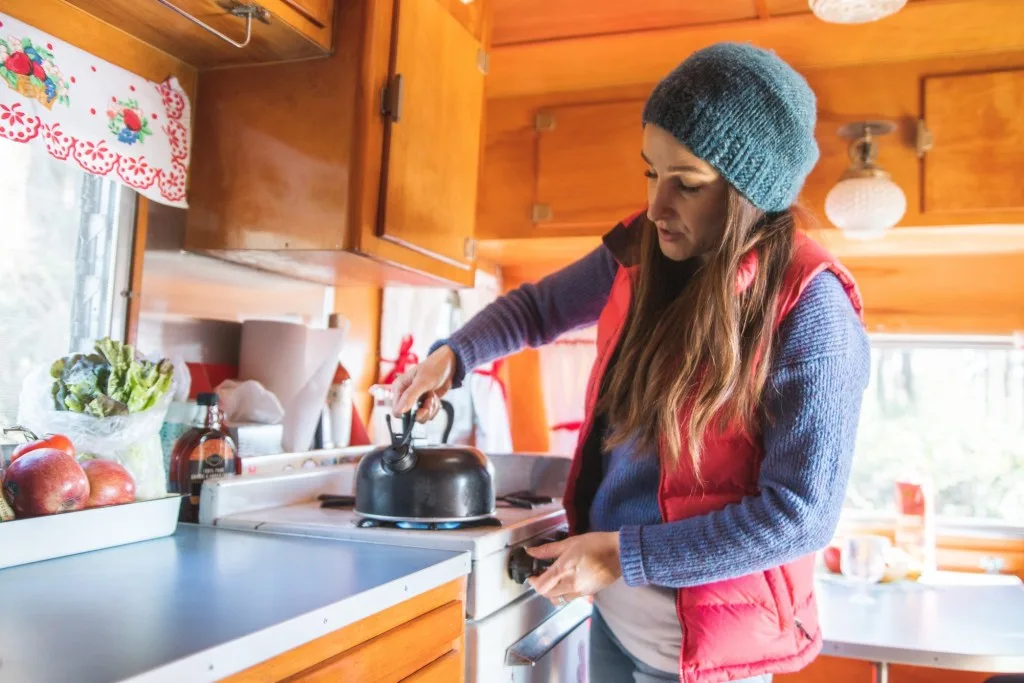Propane and camping go hand-in-hand for most of us, especially in an RV.
But should you keep your propane tanks open all the time?
Spoiler alert: no, you shouldn’t.
We’ll explain why along with some things you can do to stay safe while traveling on the road. Let’s get started!

Should You Leave Your RV Propane Tanks Open or Closed?
You might think you can leave your propane tanks open all the time. However, that may not be the safest option. As we already stated, we don’t think it’s a good idea.
Let’s compare the pros and cons of leaving your tanks open or closed.
When to Leave RV Propane Tanks Open
The only time you need to leave your propane tanks open is when you’re parked, set up at camp, and ready to use propane. This can save you from big issues and small problems, alike.
When Parked and Consistently Using Propane Appliances
Your water heater, refrigerator, furnace, stove, oven, and grills run off propane. Some of these can also run off electricity.
But depending on the price of propane, it may be more cost-effective for you to utilize propane, particularly if your campsite charges you for electricity usage.

Running your appliances on propane can help conserve your kilowatt usage for other high-energy appliances. In summer, consider running appliances on propane to free up kilowatts for your air conditioners.
Other times, it may also serve you well to reserve your electricity for other devices like your dehumidifier, dryer (if you have one on board), and electric kettle. Running off propane is especially helpful when you don’t have electric hook-ups.
If you prefer to boondock or dry-camp, you’ll really need your propane.
When to Close Your RV Propane Tank
Just because you can leave your propane tanks open while driving doesn’t mean you should. Here’s when we think you should close your RV propane tanks.
When Driving
Did you know some states have specific laws regarding onboard propane use while driving? These laws often pertain to tunnels, like in Virginia, where you must stop to get your propane tanks checked before driving a motorhome through a tunnel.
In New York and New Jersey, you can’t drive with your propane on while in tunnels and even on some lower bridges.
Keep in mind: Your RV fridge may be the biggest culprit for RV fires. Here’s why.
When Not Using Your RV
When your RV sits for a long period or is in storage, it’s best to turn off your propane valves. If you leave your propane on and get a leak, you won’t know about it.
If a gas appliance gets bumped on somehow, you wouldn’t know about that either. The leak might not pose a risk to anyone since the RV is empty, but it poses a big fire and explosion risk.
When Consistently Not Using Propane Appliances
If you’re consistently using a gas appliance, you have a good chance of knowing that the propane lines are working appropriately and not leaking.
On the flip side, if you don’t use those appliances but leave your propane on, you could develop a leak and not even know about it.
If You Suspect a Leak or Smell Propane
Just as you take action when you smell a natural gas leak in your home, you should take notice when you smell a propane leak in your RV. When you have a propane leak, you should recognize the smell right away.
Think rotten eggs or rotten cabbage. Or it may have a strong gas smell. Interestingly enough, propane has no odor. Instead, propane companies add in a harmless chemical to give it its smell, making it more likely you’ll know if there’s a leak.
For any leaks, take safety measures immediately, and proceed with caution. If you find a leak when changing tanks, turn off the propane valve and check your connections and hoses.
Keep the propane turned off until you address all sources of the leak.
Pro Tip: This is the best RV propane detector on the market, in our opinion.
If you’re in your RV and smell propane, turn off the propane shut-off valve right away. If the smell is strong, evaluate the RV and call a propane company or 911 immediately. Similarly, if you hear propane leaking, proceed with caution and call a propane company or 911.
Take care to remove any source of flame from around the area and alert others nearby.
Only return to the RV once you know it’s safe to re-enter and you’ve aired out the area.
Why You Should Close Your Propane Tank When Driving
You might wonder why it’s such a big deal to drive while your propane is on. There are a few reasons. First, any leaking propane could result in an explosion from even the smallest ignitions, like a fender bender or a small car accident.
Even if your trip is accident-free, high temperatures can ignite your gas supply. And tanks can explode when the pressure exceeds the amount that the tank can vent. When this happens, the tank bursts.
In all these scenarios, not only are you at risk on the road, but you’re putting nearby drivers at risk, too.
How to Keep Your RV Fridge Cold When Driving
You don’t need to keep your refrigerator running while driving to keep your contents cool. In fact, you can go several hours without having the refrigerator or freezer turned on.
To keep your fridge cool and your freezer contents frozen, here are some things to keep in mind. Keep your fridge and freezer packed to keep the cool air inside. Try to limit opening your fridge and freezer doors so you can keep the cool air inside.
You can put ice packs inside to insulate the food. If you have an inverter on board, you can even run off DC power while you drive.
Once you get to your stop, don’t forget to turn on the refrigerator.
RV Propane Safety Tips
Propane, like any fuel, can be dangerous. We’ve compiled some safety tips to keep you prepared.
Use LPG Alarm
Remember, propane is naturally odorless, and it may not always include the additive to make it smell. It’s also invisible. Leaks can also happen while you’re asleep, lessening the chance you’d smell it.
For these scenarios and more, an LPG or liquefied petroleum gas alarm is a necessary investment. It detects propane inside your RV and then sounds a loud alarm to notify you. Your RV likely came with one of these, particularly if it’s newer. If you purchased your RV used from a private individual, or it’s older and doesn’t come with an alarm, add one.
Additionally, check the age of your LPG alarm. You need to replace these every five years. Test your LPG alarm every week to ensure it’s operating correctly.

Have Your System Regularly Inspected
It’s a good idea to get regular inspections. Some propane lines aren’t always visible, like if they’re located in the enclosed underbelly of your RV. The lines connect with regular threads, and it’s possible they can loosen over time as you travel on your bumpy adventures.
If your propane tank is removable, it needs to comply with Department of Transportation (DOT) standards and guidelines since it’s a portable cylinder tank.
A qualified technician needs to recertify the tanks every five or 10 years, depending on past certifications. If it’s past the recertification, it’s unlawful for a propane filling station to refill it.
When it’s time, you’ll need to do a bit of research to find the nearest location to recertify your propane tank. If the recertification shows any issues with your tank, you’ll have to get an authorized DOT facility to rebuild or repair your tank.
Depending on the severity, you may even need to purchase a new tank.

Always Check Connections When Swapping Tanks
There are several products to spray on your propane tanks and lines to detect leaks. They’re simple to use; spray the product on, and if it bubbles, you’ve got a leak.
Alternatively, you can use soapy water. Since the spray-on products can detect the smallest of leaks, it may be worth the few dollars to purchase the spray and quickly get to the root of the cause.
It’s best to test your tank and valves every time you change a tank to ensure there aren’t leaks. Many propane refill stations will also test your tank valves with spray, but if they don’t, that’s something you can do yourself.
After putting the tank into the RV and connecting it to your propane line, tighten the connections appropriately. Once you open the propane valve, smell for any propane.
A smell test is not perfect, though. Occasionally you can smell propane because you just got it filled, and some leaked out. If you smell propane, turn off your propane right away and do some investigating to determine if you actually have an issue or if it’s just residual propane.
Rarely, you may hear propane leaking out, similar to air coming out of a tire. In that case, turn off your propane right away.
Use Common Sense When it Comes to RV Propane and Tanks
Propane is a lifeline when camping. But it’s also a fuel under pressure, which means there’s a certain risk to it. To reduce any risk of explosion or fire, use some good common sense.
If you follow these safety tips, you’ll help keep you, your RV, and others around you stay safe.
How do you use caution with your RV propane system?
Discover the Best Free Camping Across the USA
To be honest with you, we hate paying for camping. There are so many free campsites in America (with complete privacy).
You should give it a try!
As a matter of fact, these free campsites are yours. Every time you pay federal taxes, you’re contributing to these lands.
Become a FREE CAMPING INSIDER and join the 100,000 campers who love to score the best site!
We’ll send you the 50 Best Free Campsites in the USA (one per state). Access the list by submitting your email below:
I’m full time in a 20′ class b motorhome, so, yes, it’s on all the time, and never a problem. I keep the fridge on auto so it switches itself. I do however, turn the fridge off while getting gasoline as I wouldn’t want it to ignite while refueling since it’s right near the gas cap.
As far as anyone checking my tank before filling it no one has ever felt like crawling underneath on their back to do so. They just fill it.
My propane tank is empty. I have it on the closed position. Can I leave it hooked up anyway or should I disconnect and get rid of it. And if so how do I do it? I don’t need the propane tank anymore. Thank you.